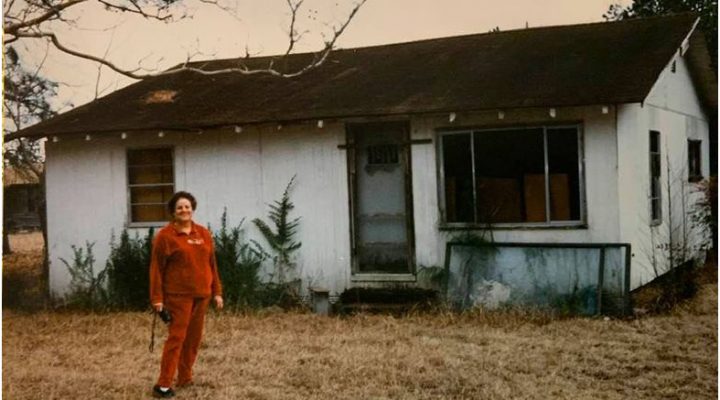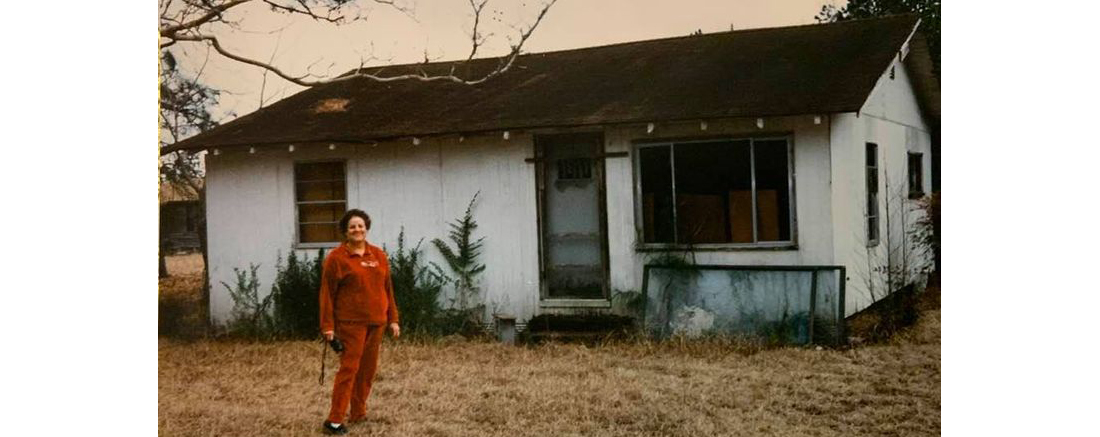Note: This article includes graphic descriptions of suicide.
In my life, she wasn’t a person. She was an event.
My mother’s mother ended her own life with a shotgun blow to the head.
It’s a conversation stopper if there ever was one.
I never met Zella Pitts Langley. She died before my parents met. Mom didn’t talk about her. I mean ever. In the 55 years we had together, we discussed Zella exactly three times.

Cathy Payne Anderson
Once, because we were driving near the Mississippi state mental hospital, Mom mentioned the many times Zella had been a patient there. She told about the day she and her siblings came home from school to find Zella had painted the living room pink and orange stripes. That was how they knew it was time for another visit.
The second conversation was in the middle of the night one night when I was in high school. I’d had a dream that mom died. I went to check on her and we stayed awake the rest of the night talking about what it was like for her to live with the fact that her mom died by suicide. She told me it was 10 years before she could wake in the morning without her mom’s suicide being her first thought.
The last time was in the early 1990s. Mom and I drove to South Mississippi to say goodbye to my Payne grandparent’s house. It was to be sold and we wanted to see it one more time. While we were there, we drove over to Ovett and found the abandoned house where mom lived growing up. The house where Zella died.
Mom walked around looking in the windows, smiling, reminiscing about helping her daddy build the house himself. It was tiny. Four rooms in a square — including the bedroom where Zella died. From my perspective, it was the bedroom where Zella broke my mother’s heart and decided not to wait around to meet me or my children.
“She wasn’t a person. She was one day — the day she died.”
I never saw a picture of Zella until I was in college. Mom had a new therapist who suggested putting up pictures from her childhood, including her parents. Even then, we didn’t discuss her. I never heard (or asked for) stories about who she was as a person or what kind of mother she was or what her life was like. She wasn’t a person. She was one day — the day she died.
This summer as we sorted through the last of the boxes in our garage, I found a paper Mom wrote during her one year as a seminary student (before she got pregnant with me.) It was titled “When Suicide Strikes Home” by Peggy Payne. It is a detailed memoir of the day her mother died from Mom’s perspective. Here are a few of her words that struck me:
“The world caved in all around me. I could hear a woman’s voice screaming — then I noticed it sounded like mine. I remember asking, ‘Did it kill her?’ The answer came in that clear, sane, voice, ‘Yes, instantly, it was in the head.’”
“Then it hit me. Mommy is dead. … I could only think of one thing. I had to get home.”
“The first person I saw was another one of my sisters. She was sitting at the table feeding her infant son. This had a stabilizing effect on me. Even in the midst of disaster — the everyday routine of life has to go on.”
“A group of our neighbors had come in and cleaned the room where Mommy was. How hard it must have been for those ladies, Mommy’s closest friends. But they chose to take care of the gruesome details so we would not have to face it.”
“They chose to take care of the gruesome details so we would not have to face it.”
“When I awoke the next morning, for just a moment I felt the usual lighthearted joy that is mine each morning. Then the thought came. With it began the flood of tears again. But the day had to be faced.”
“A member of the family had to go to the funeral home to make arrangements. I was the only one who could. Everyone else had collapsed or could not even face the possibility of going.”
“Our former pastor stood and shared real experiences from Mommy’s life with the congregation. He told of her faithful service to the church, but more important of how she could always be counted upon to respond to individuals in need. She was always the first one there when a need arose.”
Since Mom died I’ve been accumulating questions I wish I had asked her but never did. Now all her siblings are dead too and there is no one left to answer.
- Tell me about the day Daddy met Papaw.
- What was your mom’s favorite flower or dessert or song?
- What made her laugh?
- Why did you decide to become a nurse?
- Who was your favorite relative? Why?
- How did you know Daddy was the one?
- What is the one thing you want my girls to remember about you?
Today, I am really missing my mom. I suppose she missed her mom every day for decades. It just never occurred to me that Zella was a person worth missing. She had friends and neighbors who loved her enough to clean up the chaos of her death. She was dependable and loving and helpful. Her funeral was so crowded with friends and loved ones that not all of them could fit inside the building — some were outside looking in. She was a person.
I am incredibly grateful for the 55 years I had with Peggy Joyce Langley Payne. She was amazing. She was loved by friends and family near and far. She always wanted to help people. Even in her days with dementia in a personal care home, she would get up in the night to comfort a crying neighbor. She would say something witty just to see me laugh. She was a great mom. I wish Zella could have seen her living out that legacy.
None of us is an event — just the worst (or even best) decision we’ve ever made. Each of us is a complicated mixture of good and bad, wise and stupid, loving and hateful.
Thanks be to God that we are loved, even in our chaos.
Cathy Payne Anderson serves as a clinical chaplain in Kennesaw, Ga.
If you or someone you love is considering suicide, dial 988 from any phone and find someone who will listen right now.


